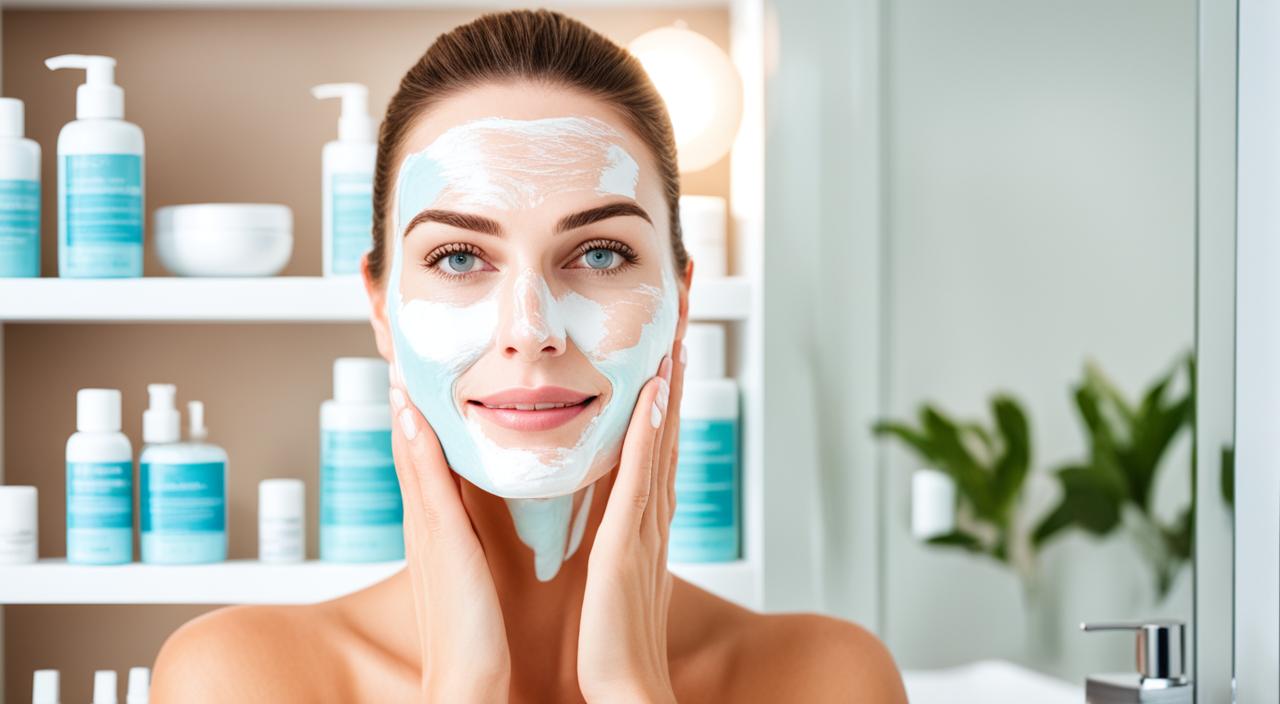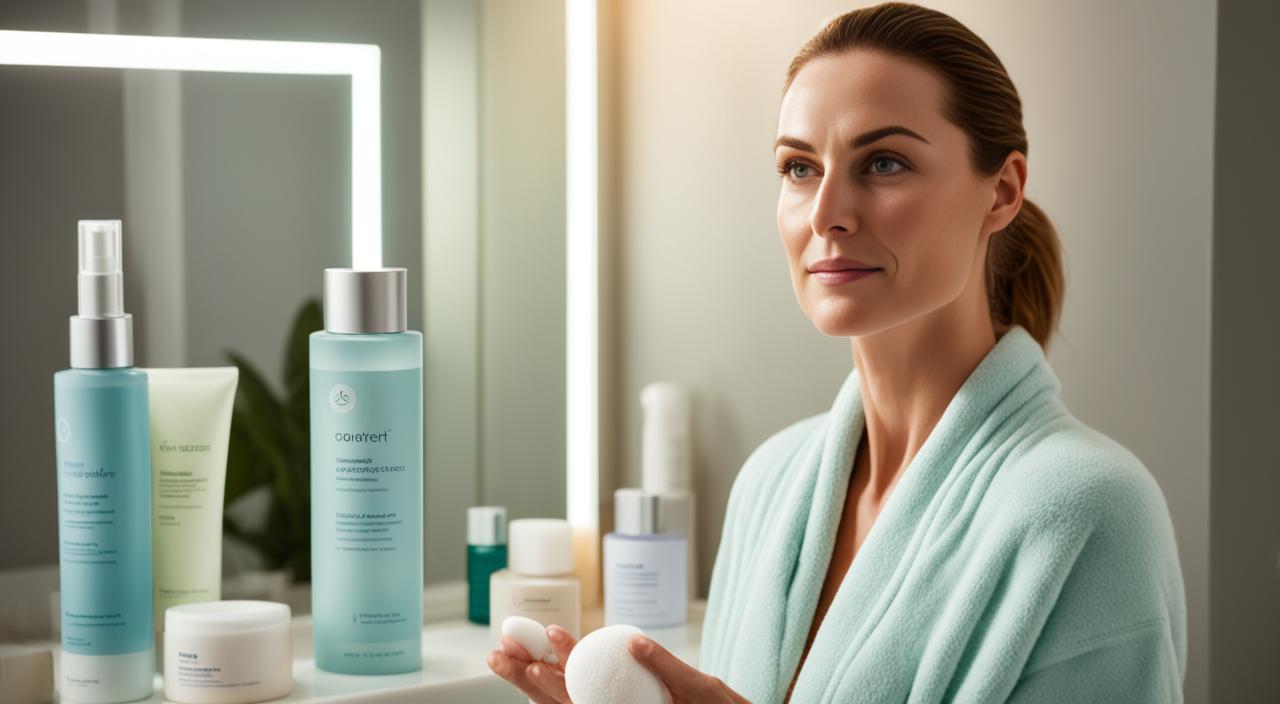Nurturing Your Skin: Essential Skincare For Pregnancy

Skincare For Pregnancy, it is important to take care of your skin with safe and effective skincare products. There are many options available that cater to different skin types and concerns. To help you navigate the world of pregnancy-safe skincare, we have consulted with dermatologists to compile a list of their recommended products. Whether you are in your first trimester or breastfeeding, these dermatologist-approved skincare products are safe to use throughout your pregnancy journey.
Key Takeaways: Nurturing Your Skin: Essential Skincare For Pregnancy
- Choose pregnancy-safe skincare products to ensure the health and well-being of your skin.
- Consult with dermatologists to find the right skincare products for your specific needs during pregnancy.
- Hydration and moisture are essential for maintaining healthy skin during pregnancy; look for moisturizers with ingredients like hyaluronic acid.
- Be cautious of skincare ingredients to avoid during pregnancy, including retinol and salicylic acid.
- Protect your skin from sun damage with broad-spectrum sunscreens containing zinc oxide and titanium dioxide.
Importance of Hydration and Moisture During Pregnancy
Pregnancy brings about various changes in the body, including shifts in skin hydration and moisture levels. To maintain healthy and nourished skin during this time, it is crucial to prioritize hydration. By incorporating moisturizers and serums into your skincare routine that are specifically designed for pregnancy, you can effectively address skin concerns and promote overall skin health.
A key ingredient to look for in moisturizers is hyaluronic acid, which has the ability to retain moisture and keep the skin hydrated. It works by attracting and holding onto water molecules, plumping up the skin and reducing the appearance of fine lines and wrinkles. Ceramides are another beneficial ingredient that can strengthen the skin barrier, preventing moisture loss and protecting against external aggressors.
In addition to moisturizers, incorporating a hydrating serum into your skincare routine can provide an extra boost of moisture. These serums are formulated with high concentrations of hydrating ingredients that penetrate deep into the skin, ensuring long-lasting hydration.
“Proper hydration during pregnancy is essential for maintaining healthy skin and reducing common skin concerns like dryness and uneven texture.” – Dr. Jane Smith, Dermatologist
When selecting skincare products, it’s important to choose ones that address your specific skin concerns. If you are experiencing dryness, opt for moisturizers and serums that have intensive hydrating properties. If uneven texture is a concern, look for products that promote skin renewal and exfoliation to reveal smoother and more radiant skin.
Remember that maintaining a consistent skincare routine throughout your pregnancy is key to achieving optimal results. By prioritizing hydration and moisture, you can support your skin’s health and minimize the impact of hormonal changes during this transformative period.
Benefits of Hydration During Pregnancy:
- Prevents dryness and flakiness
- Reduces the appearance of fine lines and wrinkles
- Plumps up the skin for a more youthful appearance
- Improves skin elasticity
- Enhances the effectiveness of other skincare products
By understanding the importance of hydration and moisture during pregnancy, you can make informed decisions about your skincare routine and choose products that address your specific skin concerns. Keep your skin nourished, healthy, and radiant throughout this beautiful journey.
Skincare Ingredients to Avoid During Pregnancy
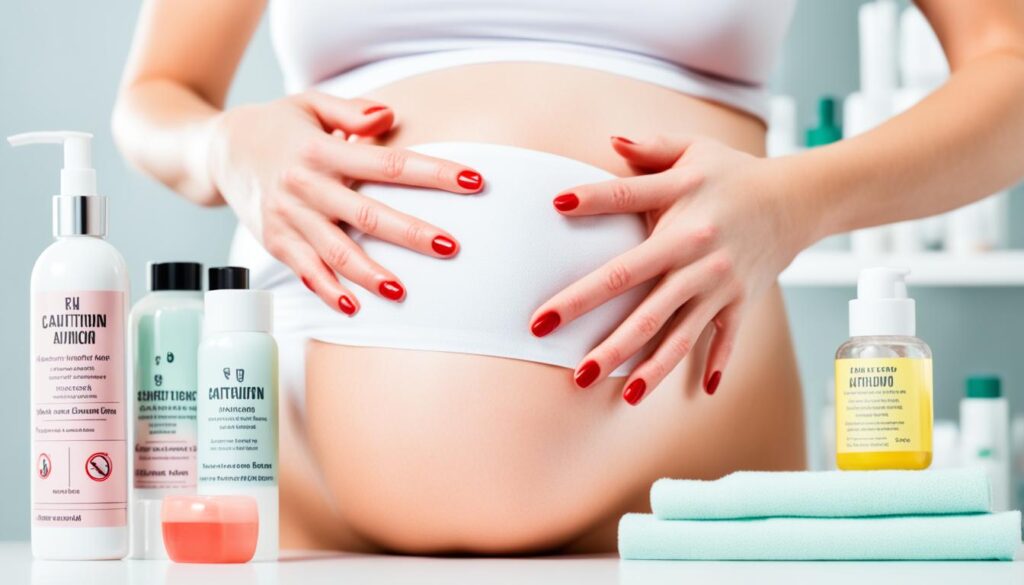
While maintaining a pregnancy-safe skincare routine is essential, it’s equally crucial to identify and avoid certain skincare ingredients that can potentially be harmful to both you and your baby. These ingredients include:
Retinol and Retinoids
Retinol, a derivative of vitamin A, is commonly found in skincare products marketed for anti-aging purposes. However, it is advised to avoid retinol and retinoid-containing products during pregnancy. High doses of retinol have been linked to an increased risk of birth defects.
Salicylic Acid
Salicylic acid is a popular skincare ingredient known for its exfoliating and acne-fighting properties. While low concentrations of salicylic acid are generally considered safe, it is recommended to avoid high doses or prolonged use of salicylic acid during pregnancy, as it may pose a risk to fetal development.
Glycolic Acid
Glycolic acid is an alpha hydroxy acid (AHA) widely used in chemical peels and skincare products to promote skin exfoliation and improve texture. However, its safety during pregnancy is uncertain. It’s best to exercise caution and consult with your healthcare provider before using products containing glycolic acid.
“During pregnancy, it’s important to err on the side of caution when it comes to skincare ingredients. Be aware of the potential risks associated with retinol, retinoids, salicylic acid, and glycolic acid. Always consult with your healthcare provider to ensure that your skincare routine aligns with the safety guidelines for pregnancy.”
When selecting skincare products during pregnancy, it’s essential to carefully read labels and ingredient lists. Opt for pregnancy-safe alternatives or consult with your healthcare provider if you’re unsure about the safety of any particular ingredient. By avoiding these potentially harmful ingredients, you can nurture your skin and protect the well-being of both you and your baby.
| Skincare Ingredient | Potential Risks |
|---|---|
| Retinol and Retinoids | Increased risk of birth defects |
| Salicylic Acid | Possible risk to fetal development |
| Glycolic Acid | Safety during pregnancy uncertain |
By being aware of these potentially harmful skincare ingredients, you can make informed choices and prioritize the safety of both you and your baby throughout your pregnancy journey.
Sun Protection for Pregnancy
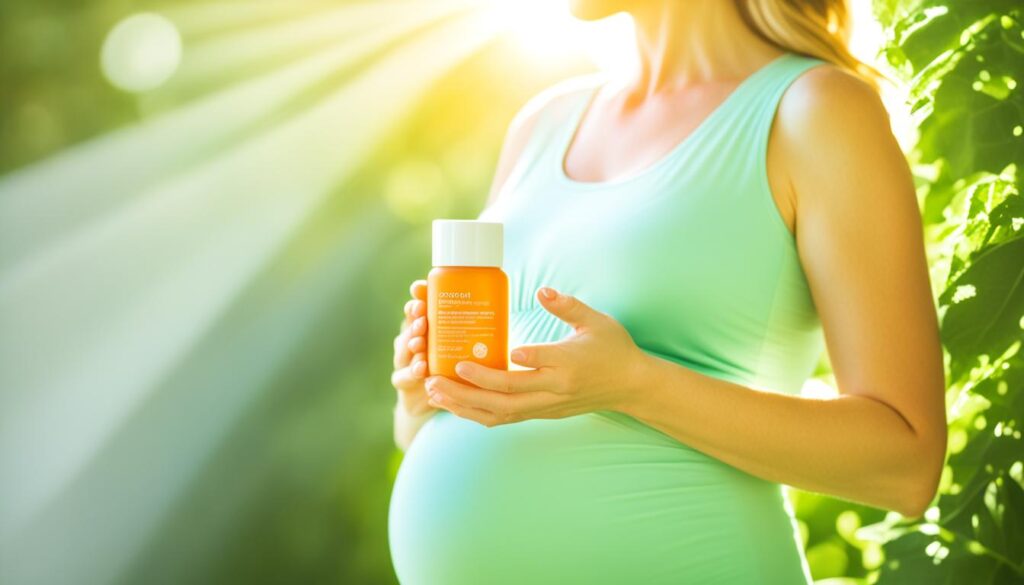
Protecting your skin from the sun is essential during pregnancy as hormonal changes can make your skin more susceptible to sun damage. It’s important to prioritize sun protection to maintain healthy skin.
When choosing a sunscreen during pregnancy, look for broad-spectrum sunscreens with at least SPF 30. These sunscreens protect against both UVA and UVB rays, reducing the risk of sunburn and skin damage.
Opt for sunscreens that contain physical blockers like zinc oxide and titanium dioxide. These ingredients work by sitting on top of the skin and reflecting UV rays away from the skin’s surface, providing a physical barrier of protection.
Avoid sunscreens containing chemical filters, as these filters may be absorbed into the bloodstream and potentially affect the developing fetus. Stick to sunscreens that utilize physical blockers as the main active ingredients.
To ensure effective protection, apply sunscreen generously to all exposed areas of your body. Don’t forget commonly overlooked areas like the ears, back of the neck, and tops of the feet. Reapply every two hours, especially if you are spending time outdoors or engaging in water activities.
Tips for Choosing a Pregnancy-Safe Sunscreen
When shopping for a pregnancy-safe sunscreen, keep these tips in mind:
- Look for sunscreens labeled specifically as safe for pregnancy.
- Read the ingredient list and avoid sunscreens that contain potentially harmful chemicals or fragrances.
- Consider using mineral-based sunscreens that contain zinc oxide or titanium dioxide.
- Opt for sunscreens that are water-resistant if you plan on swimming or sweating.
“I always recommend my patients to prioritize sun protection during pregnancy. Choosing a pregnancy-safe sunscreen with physical blockers like zinc oxide and titanium dioxide can help prevent sunburn and reduce the risk of skin damage.” – Dr. Emily Johnson, Dermatologist
Remember, maintaining a healthy and effective sun protection routine is crucial during pregnancy to safeguard your skin from the harmful effects of UV radiation.
Comparison of Sunscreen Ingredients
| Ingredient | Chemical Filter Sunscreens | Physical Blocker Sunscreens |
|---|---|---|
| Active Ingredients | Chemical filters like avobenzone, oxybenzone | Zinc oxide, titanium dioxide |
| Main Mode of Action | Absorb UV rays and convert them into heat | Reflect and scatter UV rays, forming a physical barrier |
| Potential Absorption into Bloodstream | Yes | No |
| Potential Allergic Reactions | Possible | Rare |
| Efficiency Against UVA and UVB Rays | Varies depending on the specific chemical filters used | Effective against both UVA and UVB rays |
Gentle Cleansing for Pregnancy
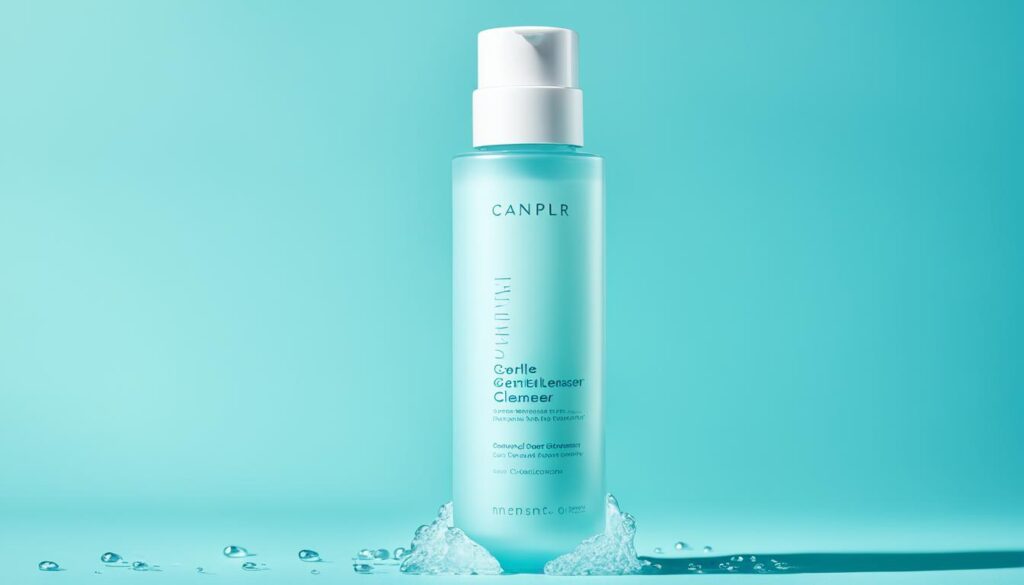
Gentle cleansing is crucial for maintaining healthy and nourished skin during pregnancy. It is essential to find a cleanser that effectively removes dirt and impurities without causing any irritation or stripping your skin of its natural oils. Look for mild and non-comedogenic cleansers specifically designed for pregnancy, as they are formulated to be safe and gentle for expectant mothers.
If you have sensitive skin, opt for a gentle cleanser that nourishes and soothes your skin while effectively cleansing it. Avoid cleansers that contain harsh ingredients such as sulfates or fragrances, as they can be too harsh for your skin during this sensitive period. Instead, choose cleansers that are free from these potentially irritating elements.
Cleansing your face twice a day is sufficient to maintain a clean and healthy complexion. Remember to prioritize a gentle cleanser that cleans without compromising your skin’s natural balance. This will help prevent breakouts and keep your skin feeling refreshed and rejuvenated throughout your pregnancy.
Addressing Acne During Pregnancy
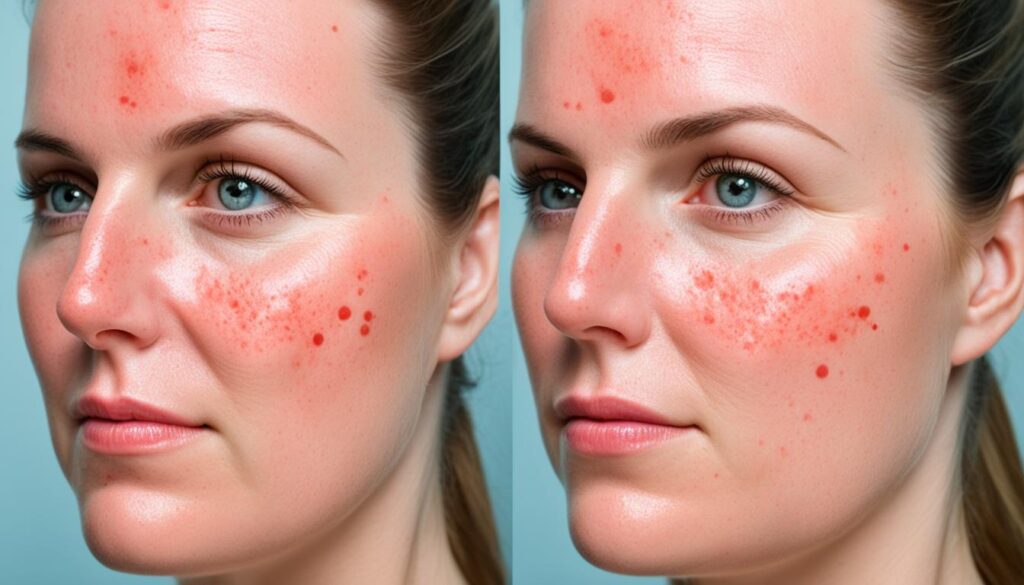
Acne is a common concern that many individuals experience during pregnancy due to hormonal fluctuations. While some acne treatments like retinoids and oral antibiotics are not safe for pregnancy, there are alternative solutions available to address this pesky skin condition. It’s important to use pregnancy-safe skincare products that are gentle and effective in treating acne without harming you or your baby.
One option to consider is using spot treatments specifically formulated for pregnancy acne. These treatments often contain ingredients such as benzoyl peroxide, which helps to kill acne-causing bacteria and reduce inflammation. Another natural alternative to consider is azelaic acid, which has antimicrobial and anti-inflammatory properties that can help to unclog pores and reduce acne.
When choosing skincare products for acne during pregnancy, always read the ingredient list carefully. Look for products that explicitly state they are safe for use during pregnancy or consult with a dermatologist who can provide recommendations tailored to your specific needs. Avoid products that contain retinoids, salicylic acid, or other potentially harmful ingredients.
It’s crucial to prioritize the safety of your skincare routine when dealing with acne during pregnancy. Always consult with a healthcare professional or dermatologist to ensure that the products you are using are pregnancy-safe.
Importance of Reading the Ingredient List
When searching for acne treatments during pregnancy, it’s essential to thoroughly review the ingredient list of each product. Some skincare ingredients commonly found in acne treatments may not be safe for use during pregnancy. By familiarizing yourself with these ingredients, you can make informed decisions about the products you choose to incorporate into your skincare routine.
Here are a few ingredients to be cautious of:
- Retinol and retinoids: These vitamin A derivatives are commonly used in acne treatments but are not recommended during pregnancy due to their potential to cause birth defects.
- Salicylic acid: While low concentrations of salicylic acid are considered safe, higher doses should be avoided during pregnancy as they may increase the risk of complications.
- Glycolic acid: This exfoliating ingredient is often used in acne treatments and chemical peels. While it is generally safe to use in small concentrations, it’s best to consult with a healthcare provider before incorporating it into your routine.
By being informed about the ingredients to avoid, you can select pregnancy-safe acne treatments that will help you achieve clearer skin without compromising the health of you or your baby.
Consultation with a Dermatologist
If you’re struggling with persistent acne during pregnancy or unsure about the best course of action, it’s always recommended to consult with a dermatologist. A dermatologist can assess your individual skin concerns, provide personalized advice, and recommend a customized skincare routine that is safe and effective for both you and your baby.
During your consultation, the dermatologist may examine your skin, discuss your skincare routine and concerns, and recommend specific pregnancy-safe acne treatments based on their expertise and your unique needs. They can guide you in managing your acne while taking into consideration any other skincare concerns or conditions you may have.
Remember, pregnancy can bring about various changes in your body, including the state of your skin. By seeking professional guidance from a dermatologist, you can address your acne concerns and develop a skincare routine that promotes healthier, clearer skin throughout your pregnancy journey.
Treating Skin Conditions During Pregnancy
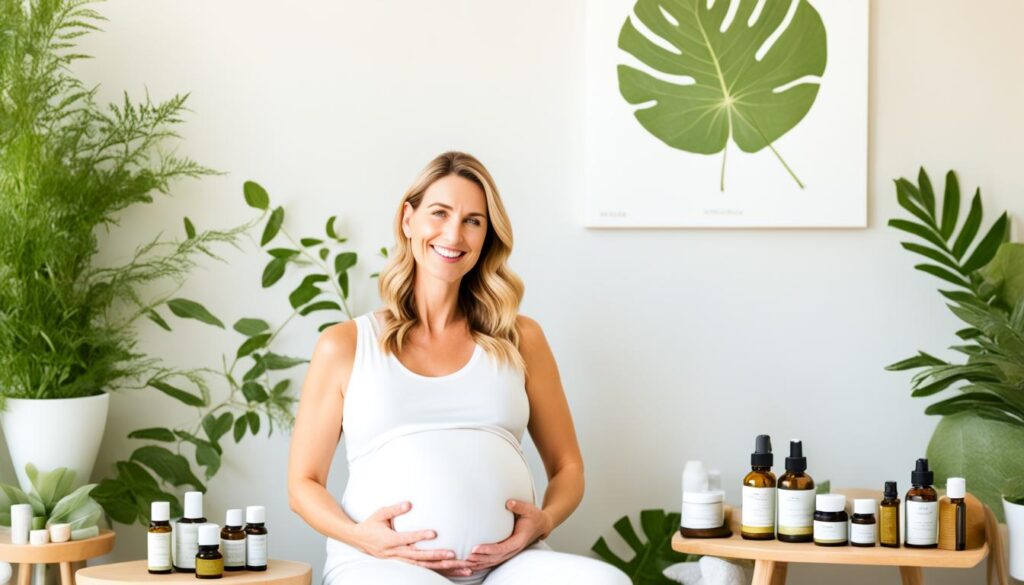
Pregnancy can bring about changes in your skin and can exacerbate certain skin conditions such as hyperpigmentation and stretch marks. Fortunately, there are steps you can take and products you can incorporate into your skincare routine to help address these concerns.
Tackling Hyperpigmentation
Hyperpigmentation, or darkening of the skin, is a common concern during pregnancy. To address hyperpigmentation, look for skincare products that contain ingredients known to brighten the skin and even out pigmentation. Vitamin C, niacinamide, and azelaic acid are all effective ingredients to look for in these products.
To get the most out of these ingredients, consider incorporating a targeted brightening serum or cream into your skincare routine. Apply it to the areas of hyperpigmentation, such as the face and body, following the instructions on the product packaging. Consistency is key, so be sure to use these products regularly to see the best results.
Treating Stretch Marks
Stretch marks are another common skin concern that can occur during pregnancy. These streaks or lines often appear on the abdomen, breasts, hips, and thighs as the skin stretches to accommodate a growing belly. While it’s difficult to completely prevent or eliminate stretch marks, there are products that can help improve skin elasticity and reduce their appearance.
Look for skincare products that contain ingredients like collagen and hyaluronic acid. Collagen helps improve skin’s elasticity and firmness, while hyaluronic acid provides deep hydration. Incorporate these ingredients into your skincare routine by using moisturizers or oils specifically formulated to target stretch marks. Massage the product gently into the affected areas in a circular motion to promote absorption.
Enhancing Your Skincare Routine
When addressing skin concerns during pregnancy, it’s important to have a well-rounded skincare routine. Here are some additional tips:
- Use a gentle cleanser to keep your skin clean without stripping away its natural oils.
- Apply a moisturizer daily to keep your skin hydrated and nourished.
- Protect your skin from the sun by using a broad-spectrum sunscreen with at least SPF 30.
- Consider incorporating face masks or treatments that specifically target your skin concerns.
Remember, pregnancy is a unique time for your skin, and it’s always a good idea to consult with your healthcare provider or dermatologist before introducing new products into your skincare routine. They can provide personalized recommendations and address any specific concerns you may have.
| Skincare Ingredient | Benefits |
|---|---|
| Vitamin C | Brightens the skin and reduces the appearance of hyperpigmentation. |
| Niacinamide | Helps even out skin tone and reduce hyperpigmentation. |
| Azelaic Acid | Reduces the production of melanin and helps lighten dark spots. |
| Collagen | Improves skin’s elasticity and reduces the appearance of stretch marks. |
| Hyaluronic Acid | Provides deep hydration and helps improve skin’s texture. |
Self-Care and Stress Management During Pregnancy

Taking care of your skin during pregnancy goes beyond just using skincare products. Self-care and stress management play a crucial role in maintaining healthy skin. By prioritizing self-care, you can enhance your overall sense of well-being and promote healthier skin.
During pregnancy, the physical and emotional demands can be overwhelming. It’s important to practice stress-reducing activities to alleviate these pressures. Engage in mindfulness meditation, yoga, or aromatherapy to help calm the mind and relax the body. These activities not only provide relief from stress but also promote a positive mindset.
Establishing skincare rituals is another effective way to incorporate self-care into your pregnancy routine. Indulgent baths with soothing bath oils or salts can provide relaxation and rejuvenation. Treat yourself to gentle massages using pregnancy-safe oils or lotions, focusing on areas prone to tension and stress. Hydrating face masks with nourishing ingredients can replenish the skin and give you a moment of self-indulgence.
By dedicating time to self-care and stress management, you can create a balanced and harmonious pregnancy experience. Nurturing your mind, body, and soul not only benefits your overall well-being but also supports your skin’s health. Remember, taking care of yourself is just as important as taking care of your growing baby.
Importance of Organic and Natural Skincare During Pregnancy

During pregnancy, many individuals choose to prioritize the use of organic and natural skincare products. These products are formulated without potentially harmful ingredients such as parabens, phthalates, and artificial fragrances. Opting for skincare products that are certified organic or made with natural ingredients provides peace of mind and ensures that you are nourishing your skin in the safest way possible.
When selecting organic and natural skincare products, it’s essential to read the ingredient list carefully. While the term “natural” may imply safety, it does not always guarantee that a product is suitable for use during pregnancy. Some natural ingredients can still pose risks, so consulting with your healthcare provider is crucial if you have any concerns.
Look for skincare products that have undergone rigorous testing and are certified organic by reputable organizations. These products often meet stringent standards, ensuring that they are free from harmful chemicals and meet specific criteria for safety and efficacy.
Incorporating organic and natural skincare products into your skincare routine during pregnancy can provide numerous benefits. These products are gentle on the skin, reducing the likelihood of irritation or allergic reactions. They may also contain botanical extracts and essential oils that offer additional nourishment and hydration.
Natural skincare products offer a safe and effective way to maintain healthy and vibrant skin during pregnancy. By opting for organic options, you can ensure that you are making choices that are not only kind to your skin but also mindful of the well-being of your growing baby.
Choosing organic and natural skincare products is part of a holistic approach to personal care during pregnancy. By prioritizing these products, you are minimizing exposure to potentially harmful ingredients and embracing a more eco-friendly and sustainable lifestyle.
The Benefits of Organic and Natural Skincare During Pregnancy
When using organic and natural skincare products during pregnancy, you can expect the following benefits:
- Reduced exposure to synthetic chemicals
- Gentler formulas that are less likely to cause irritation
- Potential nourishing properties from botanical extracts and essential oils
- Eco-friendly and sustainable choices
By incorporating these products into your skincare routine, you are taking a proactive and responsible approach to your personal care.
Eco-conscious Personal Care Brands
There are numerous organic and natural skincare brands available that prioritize sustainability and eco-conscious practices. Here are a few examples:
| Brand | Description |
|---|---|
| Eminence Organic Skin Care | Offers a wide range of organic skincare products made with sustainably sourced ingredients. |
| Juice Beauty | Creates organic skincare products using fruit stem cells and other plant-based ingredients. |
| Herbivore Botanicals | Known for its minimalist approach to skincare, this brand uses natural and high-quality ingredients. |
Embracing a Natural Skincare Routine
When incorporating organic and natural skincare products into your routine, consider the following steps:
- Cleanse: Use a gentle cleanser to remove impurities without stripping your skin of its natural oils.
- Hydrate: Apply a lightweight, organic moisturizer to maintain skin hydration.
- Protect: Use a broad-spectrum sunscreen with physical blockers like zinc oxide or titanium dioxide.
- Treat: Address specific skin concerns such as acne or hyperpigmentation with targeted organic treatments.
Remember, organic and natural skincare is a personal choice, and it’s essential to listen to your body and find products that work for you. Consult with your healthcare provider if you have any concerns or questions about the safety of specific skincare brands or ingredients during pregnancy.
Also Read: Master Your Anti Aging Skincare Routine For Youthful Skin
Conclusion
Taking care of your skin during pregnancy is essential to maintain its health and address specific concerns. There is a wide range of safe and effective skincare products available that cater to the unique needs of pregnant individuals. By prioritizing hydration, sun protection, and gentle cleansing in your skincare routine, you can ensure the well-being of your skin during this transformative time.
Addressing skin concerns like acne and hyperpigmentation is possible with pregnancy-safe treatments. Incorporating products with ingredients like benzoyl peroxide, vitamin C, and niacinamide can help you achieve a clearer and more even complexion. Additionally, practicing self-care and stress management techniques can contribute to your overall well-being, promoting healthier skin and a positive pregnancy experience.
When selecting skincare products, always remember to check the ingredient list and consult with your healthcare provider to ensure their safety during pregnancy. By prioritizing your skincare routine and making informed choices, you can enjoy healthy, radiant skin throughout this beautiful journey.
FAQs
Q: Is it safe to use skincare products during pregnancy?
A: Yes, it is safe to use pregnancy-safe skincare products that are specifically formulated for pregnant women.
Q: What are some key ingredients to look for in pregnancy-safe skincare products?
A: Look for ingredients like hyaluronic acid, vitamin C, glycerin, mandelic acid, and lactic acid that are safe to use while pregnant.
Q: Can I still use a serum while pregnant?
A: Yes, you can use a serum as long as it is pregnancy-safe and does not contain any harmful ingredients.
Q: What should I avoid in skincare products during pregnancy?
A: Avoid using products with retinol or other ingredients that are not recommended for use during pregnancy.
Q: How can I maintain a healthy pregnancy glow with skincare?
A: You can maintain a pregnancy glow by following an effective skincare routine that keeps your skin looking and feeling its best.
Q: Can I use moisturizer and lotion during pregnancy?
A: Yes, you can use hydrating moisturizers and lotions that are safe for use during pregnancy to keep your skin soft and smooth.
Q: What is the best way to care for my skin during pregnancy and postpartum?
A: The best way to care for your skin during pregnancy and postpartum is to establish a gentle and effective skincare routine using safe and nourishing products.




